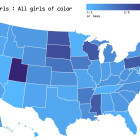
Analysis: Litigation Is Important Tool in Youth Corrections Reform
|
Bringing lawsuits against officials at a youth correctional facility can take years of work to force needed changes, but sometimes is necessary
Juvenile Justice Information Exchange (https://jjie.org/page/185/)

In late September, Torri was driving down the highway with her 11-year-old son Junior in the back seat when her phone started ringing.
It was the Hamilton County Sheriff’s deputy who worked at Junior’s middle school in Chattanooga, Tennessee. Deputy Arthur Richardson asked Torri where she was. She told him she was on the way to a family birthday dinner at LongHorn Steakhouse.
“He said, ‘Is Junior with you?’” Torri recalled.
Earlier that day, Junior had been accused by other students of making a threat against the school. When Torri had come to pick him up, she’d spoken with Richardson and with administrators, who’d told her he was allowed to return to class the next day. The principal had said she would carry out an investigation then. ProPublica and WPLN are using a nickname for Junior and not including Torri’s last name at the family’s request, to prevent him from being identifiable.
When Richardson called her in the car, Torri immediately felt uneasy. He didn’t say much before hanging up, and she thought about turning around to go home. But she kept driving. When they walked into the restaurant, Torri watched as Junior happily greeted his family.
Soon her phone rang again. It was the deputy. He said he was outside in the strip mall’s parking lot and needed to talk to Junior. Torri called Junior’s stepdad, Kevin Boyer, for extra support, putting him on speaker as she went outside to talk to Richardson. She left Junior with the family, wanting to protect her son for as long as she could ...

Bringing lawsuits against officials at a youth correctional facility can take years of work to force needed changes, but sometimes is necessary

They’re labeled thugs, treated like throwaways and classified by some as “superpredators”: teenage boys and girls who seek sanctuary in gangs, commit violent crimes and end up in the criminal justice system. Not only are they physically locked up, but these children are caged in emotional turmoil.
JJIE intern Claire Bohrer experimented with Instagram and Facebook videos.

We are at a major turning point right now with mass incarceration, which is the No. 1 public health crisis as the Vera Institute says in its report.

States should do more to protect the confidentiality of juvenile records to ensure young adults are able to access education and employment, a new report says.

Medium, the online writing platform, is hosting a series of Digital Town Hall Meetings focused on criminal justice reform. This will be Medium’s first attempt at this type of event. “Imagine a live-blogging event, but instead of hearing from only a couple journalists, anyone on the platform can ask questions and share their own expertise." The first meeting, discussing why people of color are disproportionately represented in the federal prison system and why some police officers abuse their powers will be held in the morning and afternoon of March 9. The first session, hosted by Nazgol Ghandnoosh of The Sentencing Project and Sakira Cook of The Leadership Conference on Civil and Human Rights, will be from 1 to 3 p.m. EST.

More than half of Americans support closing youth prisons and redirecting the savings to community-based programs, data that gives momentum to efforts to close facilities around the country, advocates say.

The Baby and Mother Bonding Initiative program (BAMBI) delivers tough love as it helps incarcerated mothers bond with their babies born in prison.